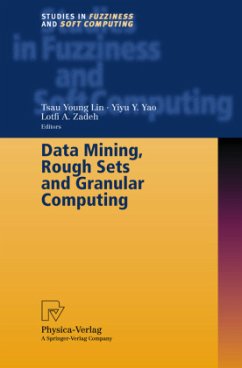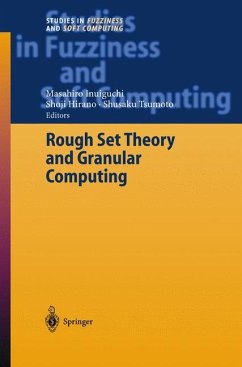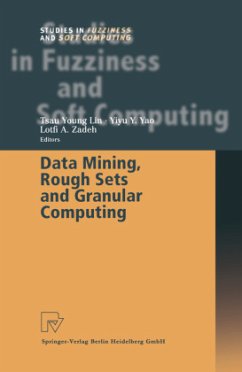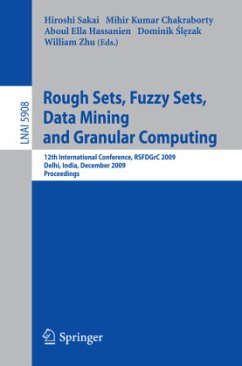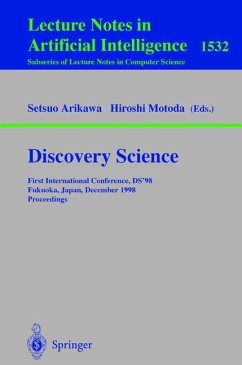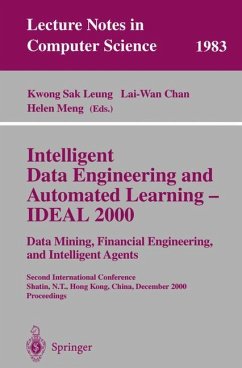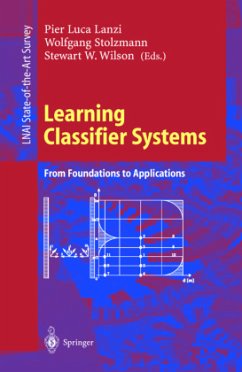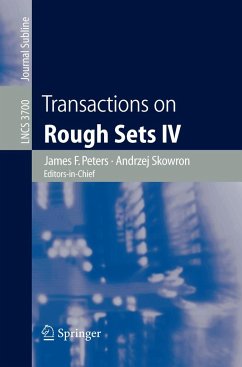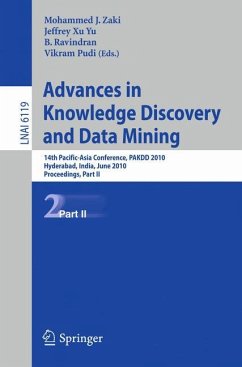
New Directions in Rough Sets, Data Mining, and Granular-Soft Computing
7th International Workshop, RSFDGrC'99, Yamaguchi, Japan, November 9-11, 1999 Proceedings
Herausgegeben: Zhong, Ning; Ohsuga, Setsuo

PAYBACK Punkte
39 °P sammeln!
This volume contains the papers selected for presentation at the Seventh Int- national Workshop on Rough Sets, Fuzzy Sets, Data Mining, and Granular-Soft Computing (RSFDGrC 99) held in the Yamaguchi Resort Center, Ube, Y- aguchi, Japan, November 9-11, 1999. The workshop was organized by Inter- tional Rough Set Society, BISC Special Interest Group on Granular Comp- ing (GrC), Polish-JapaneseInstitute of Information Technology,and Yamaguchi University. RSFDGrC 99providedaninternationalforumforsharingoriginalresearch results and practical development experiences among experts in these emerging ?e...
This volume contains the papers selected for presentation at the Seventh Int- national Workshop on Rough Sets, Fuzzy Sets, Data Mining, and Granular-Soft Computing (RSFDGrC 99) held in the Yamaguchi Resort Center, Ube, Y- aguchi, Japan, November 9-11, 1999. The workshop was organized by Inter- tional Rough Set Society, BISC Special Interest Group on Granular Comp- ing (GrC), Polish-JapaneseInstitute of Information Technology,and Yamaguchi University. RSFDGrC 99providedaninternationalforumforsharingoriginalresearch results and practical development experiences among experts in these emerging ?elds.An importantfeatureoftheworkshopwasto stresstheroleofthe integ- tion of intelligent information techniques. That is, to promote a deep fusion of these approaches to AI, Soft Computing, and Database communities in order to solve real world, large, complex problems concerned with uncertainty and fuz- ness. In particular, rough and fuzzy set methods in data mining and granular computing were on display. The total of 89 papers coming from 21 countries and touching a wide spectrum of topics related to both theory and applications were submitted to RSFDGrC 99. Out of them 45 papers were selected for regular presentations and 15 for short presentations. Seven technical sessions were organized, namely: Rough Set Theory and Its Applications; Fuzzy Set Theory and Its Applications; Non-Classical Logic and Approximate Reasoning; Information Granulation and Granular Computing; Data Mining and Knowledge Discovery; Machine Lea- ing; Intelligent Agents and Systems. TheRSFDGrC 99programwasenrichedbyfourinvitedspeakers:Zdzis law Pawlak, Lot? A. Zadeh, Philip Yu, and Setsuo Arikawa, from Soft Computing, Database, and AI communities. A special session on Rough Computing: Fo- dations and Applications was organized by James F. Peters.



